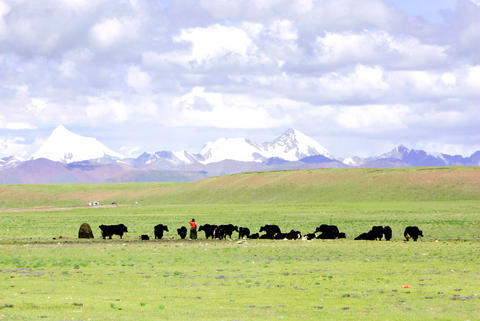China is forcing nomadic Tibetan herders to settle in towns to clear land for development, leaving many unable to earn a living, a human rights group said in a report issued yesterday.
Herders have been forced to slaughter herds of yaks, sheep and goats and Communist Party officials have paid minimal compensation and failed to protect Tibetans' legal rights, Human Rights Watch said. It said tens of thousands, and possibly hundreds of thousands, of people have been affected.
The group appealed to Beijing to suspend the resettlements until a review system is put in place and to allow Tibetans to return to their land if they were forcibly moved or received no compensation.

PHOTO: AP
"They are destroying our Tibetan [herder] communities by not letting us live in our area and thus wiping out our livelihood completely," one Tibetan identified as "F.R." was quoted as saying.
Human Rights Watch said the resettlements in Tibet and in adjacent ethnic Tibetan areas of Sichuan, Gansu and Qinghai provinces are linked to Beijing's effort, launched in 1999, to develop China's poor, restive west and bind it to the bustling east.
The resettlements began in 2000 and have taken place more intensively since 2003, Human Rights Watch said.
Others were evicted to make room for public works projects, like dams and roads, it said in a report entitled No One Has the Liberty to Refuse.
"Tibet remains a source of anxiety for the Chinese government, which is eager to suppress any impulses toward independence or true autonomy, and to ensure its hold on a key strategic region," it added.
The group said it interviewed about 150 Tibetans affected by relocation between July 2004 and December 2006, but did not reveal their names to prevent the authorities going after them.
New York-based Human Rights Watch said another motive for the relocations could be to further undermine Tibetans' unique cultural identity and bring them into the Chinese mainstream, as it has also done in Muslim Xinjiang and Inner Mongolia.
The most extreme efforts were in Sichuan's Golok region, where authorities banned grazing in 2003 and required herders to sell their herds and move into newly built townships, Human Rights Watch said, citing interviews with Tibetans who were affected.
It quoted one as saying: "Even if we become town dwellers and try to do business, we don't have the education or the experience to succeed. We don't even know how to live from farming. So in the future we will face great difficulty."
"Many Tibetan agricultural communities have had their land confiscated, with minimal compensation, or have been evicted to make way for mining, infrastructure projects or urban development," the report said.
Overseas donors should also make sure their funds are not involved in evictions and relocations, Human Rights Watch said.
"Chinese officials claim to be promoting economic development and protecting the environment, but it is hard to see those goals actually being achieved or benefiting Tibetan herders," said Brad Adams, Asia director at Human Rights Watch.
Chinese authorities explained the changes as a response to overgrazing by Tibetan herds that was causing erosion and soil loss, Human Rights Watch said.

Archeologists in Peru on Thursday said they found the 5,000-year-old remains of a noblewoman at the sacred city of Caral, revealing the important role played by women in the oldest center of civilization in the Americas. “What has been discovered corresponds to a woman who apparently had elevated status, an elite woman,” archeologist David Palomino said. The mummy was found in Aspero, a sacred site within the city of Caral that was a garbage dump for more than 30 years until becoming an archeological site in the 1990s. Palomino said the carefully preserved remains, dating to 3,000BC, contained skin, part of the

TRUMP EFFECT: The win capped one of the most dramatic turnarounds in Canadian political history after the Conservatives had led the Liberals by more than 20 points Canadian Prime Minister Mark Carney yesterday pledged to win US President Donald Trump’s trade war after winning Canada’s election and leading his Liberal Party to another term in power. Following a campaign dominated by Trump’s tariffs and annexation threats, Carney promised to chart “a new path forward” in a world “fundamentally changed” by a US that is newly hostile to free trade. “We are over the shock of the American betrayal, but we should never forget the lessons,” said Carney, who led the central banks of Canada and the UK before entering politics earlier this year. “We will win this trade war and

‘BODIES EVERYWHERE’: The incident occurred at a Filipino festival celebrating an anti-colonial leader, with the driver described as a ‘lone suspect’ known to police Canadian police arrested a man on Saturday after a car plowed into a street party in the western Canadian city of Vancouver, killing a number of people. Authorities said the incident happened shortly after 8pm in Vancouver’s Sunset on Fraser neighborhood as members of the Filipino community gathered to celebrate Lapu Lapu Day. The festival, which commemorates a Filipino anti-colonial leader from the 16th century, falls this year on the weekend before Canada’s election. A 30-year-old local man was arrested at the scene, Vancouver police wrote on X. The driver was a “lone suspect” known to police, a police spokesperson told journalists at the

North Korean leader Kim Jong-un has unveiled a new naval destroyer, claiming it as a significant advancement toward his goal of expanding the operational range and preemptive strike capabilities of his nuclear-armed military, state media said yesterday. North Korea’s state-run Korean Central News Agency (KCNA) said Kim attended the launching ceremony for the 5,000-tonne warship on Friday at the western port of Nampo. Kim framed the arms buildup as a response to perceived threats from the US and its allies in Asia, who have been expanding joint military exercises amid rising tensions over the North’s nuclear program. He added that the acquisition